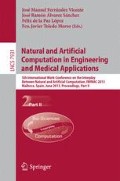Abstract
In this paper we study the use of Reinforcement Learning Actor-Critic methods to learn the control of a ball-screw feed drive. We have tested three different actors: Q-value based, Policy Gradient and CACLA actors. We have paid special attention to the sensibility to suboptimal learning gain tuning. As a benchmark, we have used randomly-initialized PID controllers. CACLA provides an stable control comparable to the best heuristically tuned PID controller, despite its lack of knowledge of the actual error value.
Access this chapter
Tax calculation will be finalised at checkout
Purchases are for personal use only
Preview
Unable to display preview. Download preview PDF.
References
Koren, Y., Lo, C.C.: Advanced controllers for feed drives. In: Annals of the CIRP, vol. 41 (1992)
Srinivasan, K., Tsao, T.C.: Machine feed drives and their control - a survey of the state of the art. Journal of Manufacturing Science and Engineering 119, 743–748 (1997)
Sutton, R., Barto, A.G.: Reinforcement Learning I: Introduction. MIT Press (1998)
Chen, J.-S., Huang, Y.-K., Cheng, C.C.: Mechanical model and contouring analysis of high-speed ball-screw drive systems with compliance effect. Int. J. Adv. Manuf. Technol. 24, 241–250 (2004)
Hasselt, H.: Reinforcement Learning in Continuous State and Action Spaces. In: Reinforcement Learning: State of the art. Adaptation, Learning, and Optimization, pp. 207–251. Springer (2012)
van Hasselt, H., Wiering, M.A.: Reinforcement learning in continuous action spaces. In: Proceedings of the 2007 IEEE Symposium on Approximate Dynamic Programming and Reinforcement Learning (2007)
Busoniu, L., Babuska, R., De Schutter, B., Ernst, D.: Reinforcement Learning and Dynamic Programming using Function Approximation. CRC Press (2010)
Hafner, R., Riedmiller, M.: Reinforcement learning in feedback control: Challenges and benchmarks from technical process control. Machine Learning 84(1-2), 137–169 (2011)
Author information
Authors and Affiliations
Editor information
Editors and Affiliations
Rights and permissions
Copyright information
© 2013 Springer-Verlag Berlin Heidelberg
About this paper
Cite this paper
Fernandez-Gauna, B., Ansoategui, I., Etxeberria-Agiriano, I., Graña, M. (2013). An Empirical Study of Actor-Critic Methods for Feedback Controllers of Ball-Screw Drivers. In: Ferrández Vicente, J.M., Álvarez Sánchez, J.R., de la Paz López, F., Toledo Moreo, F.J. (eds) Natural and Artificial Computation in Engineering and Medical Applications. IWINAC 2013. Lecture Notes in Computer Science, vol 7931. Springer, Berlin, Heidelberg. https://doi.org/10.1007/978-3-642-38622-0_46
Download citation
DOI: https://doi.org/10.1007/978-3-642-38622-0_46
Publisher Name: Springer, Berlin, Heidelberg
Print ISBN: 978-3-642-38621-3
Online ISBN: 978-3-642-38622-0
eBook Packages: Computer ScienceComputer Science (R0)

